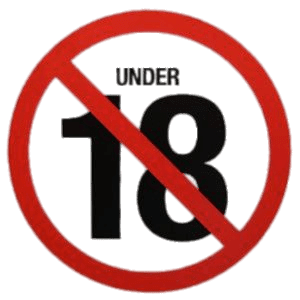This article appeared in Knife Magazine in May 2021.
Know Your Knife Laws – Age-Based Knife Laws
By Daniel C. Lawson, Attorney and Knife Expert

 Statutory restrictions involving knives based on age are in effect in roughly half of the U.S. states. It seems that these laws are widely assumed to be more restrictive than they actually are. This assumption may be attributable to policies adapted by knife retailers based on prudent risk avoidance, given the specter of civil tort liability. From the retail knife vendor’s perspective, the risk of selling a knife to someone under the age of 18 outweighs the modest benefit from lost sales to that age group.
Statutory restrictions involving knives based on age are in effect in roughly half of the U.S. states. It seems that these laws are widely assumed to be more restrictive than they actually are. This assumption may be attributable to policies adapted by knife retailers based on prudent risk avoidance, given the specter of civil tort liability. From the retail knife vendor’s perspective, the risk of selling a knife to someone under the age of 18 outweighs the modest benefit from lost sales to that age group.
Age-based restrictions, which may be described as “supply-side” prohibitions, are the most common. The apparent objective is to prevent individuals under a certain age from acquiring certain types of knives, the possession of which may be inconsistent with their level of maturity and/or discretion.
An example is the Alabama statute § 13A-11-57, which provides that any person who sells, gives, or lends to a minor (anyone under the age of 19) a bowie knife, or other knives of like-kind or description, shall, be fined not less than fifty dollars, but not more than five hundred dollars. This statute dates to 1852, and the likely objective was to prevent minors from being equipped to duel. It uses much of the same wording as an Alabama anti-dueling measure enacted in 1837, which provided:
That if any person carrying any knife or weapon, known as Bowie Knives or Arkansas Tooth-picks or either or any knife or weapon that shall in form, shape, or size, resemble a Bowie-knife or Arkansas Tooth-pick, on a sudden encounter, shall cut or stab another with such knife, by reason of which he dies, it shall be adjudged murder, and the offender shall suffer the same as if the killing had been by malice of forethought.
It may be that prohibiting the transfer of Bowie knives to minors was effective. Research reveals not a single case in 170 years exists where such an issue has arisen.
The disposition or transfer law in New York State sets the age of prohibition at 16 and operates on sellers and persons ineligible because of age. Per § 265.10 (5), a person who disposes of a “switchblade knife, gravity knife, ballistic knife, metal knuckles knife, or undetectable knife” to anyone under 16 years is guilty of a misdemeanor. A person under that age who possesses any of said knives – or any “dangerous knife” – shall be adjudged a juvenile delinquent per § 265.05. Fortunately, the transfer of a “dangerous knife” to someone under 16 is not unlawful since that term is applied elastically.1
State law prohibitions pertaining to the transfer of knives to minors generally do not apply to all knives. Instead, the scope of the restriction is typically to larger knives or disfavored types – dirks, daggers, stilettos, and bowie knives. For instance, New Jersey 2C:39-9.1 prohibits the transfer of any “hunting, fishing, combat, or survival knife, having a blade length of five inches or more, or an overall length of ten inches.” The Rhode Island analog prohibits the sale of a dagger, dirk, stiletto, sword-in-cane, bowie knife, razor, or knife of any description having a blade of more than three inches to a minor without the consent of a parent.
The Texas version of this law is simple, symmetrical, and largely objective in contrast. Section 46.01 defines a “location-restricted knife” as any knife with a blade longer than five and one-half inches. It delineates a blade length of 5-1/2 inches or what is defined as a location-restricted knife. It is unlawful for an individual under the age of 18 to “intentionally, knowingly, or recklessly carry on or about his or her person a location-restricted knife.” It is also unlawful for an adult to intentionally or knowingly sell or give a location-restricted knife to any minor younger than eighteen.
Alaska, Arizona, and West Virginia are states where some restrictions on the possession or carry of certain knives extend to people who have not reached twenty-one years.
It is unlawful in Alaska, for instance, for persons under the age of 21 to carry a deadly weapon concealed. There is an exception for “outdoor activity” that necessarily involves a weapon for self-defense. Presumably, this is a matter of concern where bears may be encountered. Persons at least 18 but not yet 21 may carry deadly weapons openly. It is unlawful to sell a “switchblade” or “gravity knife” to someone under eighteen. But emancipated minors and persons at least age 16 may possess a switchblade or gravity knife if they have permission from a parent. “Pocketknives” are excluded from most restrictions.
Arizona statute § 13-3102 is similar to Alaska law. It prohibits the concealed carry of a “deadly weapon except for a pocketknife” by anyone under twenty-one. There are no age-based transfer restrictions applicable to knives in Arizona.
West Virginia law § 61-7-4a provides that persons who have reached 18 may acquire a “provisional license,” which allows the concealed carry of deadly weapons. Unemancipated persons under that age may not possess or carry deadly weapons. Persons at least 18, but not 21, who do not hold a provisional license may not lawfully carry a concealed deadly weapon. Summarily, it is unlawful to transfer a deadly weapon to anyone who is prohibited from possessing it. Fixed blade and manual pocketknives with blades not exceeding 3-1/2 inches in length are generally excluded from the class of deadly weapons.
Wisconsin and Pennsylvania are among the states that restrict the sale of dangerous weapons or deadly weapons to minors. In both states, the applicable definition incorporates a designed-as-a-weapon element.
Florida law also restricts the transfer of weapons, including knives in general, but excludes “common pocketknives” to minors. Two levels of restriction apply. It is a felony for a “dealer in arms” to sell a bowie or dirk to a minor per 790.18. The same conduct by a non-dealer individual is a misdemeanor per 790.17.
While age-based restriction laws regarding transfer impose a burden on sellers, there is also a modest benefit. The laws can be invoked as a legislative imprimatur as a defense against civil tort liability.
The Alabama Supreme Court case of Stanford v. Wal-Mart Stores Inc., 600 So.2d 234, was a civil liability or tort lawsuit by the parents of a nine-year-old boy who purchased a dart game at a Walmart store. The facts indicate that the boy, acting alone, made the purchase and paid cash. The following day, a friend of that same age threw a dart, striking him in the eye, causing the loss of that organ. The parents sought civil compensation on the grounds of a negligent entrustment theory, which essentially provides that one should not make available an item to someone where there is an appreciable risk of harm to the recipient. (Lending an automobile to a visibly intoxicated person is the textbook example of negligent entrustment.) The Court stated:
This Court has briefly reviewed the Alabama Code and notes that the legislature is aware of its role in the protection of minors and of its ability to protect minors from dangerous products. In several instances, the Alabama legislature has already accomplished this by making the sale of certain products to minors illegal. The products that the legislature has determined to be dangerous to minors include pistols, § 13A–11–57, bowie knives or knives of similar description, . . . cigarettes, and alcoholic beverages . . . The legislature has not, however, suggested that darts are so inherently dangerous as to warrant statutory regulation… because the sale of the darts did not violate any state or federal statute or regulation, and because the legislature has not prohibited sales of darts to minors, this Court declines to place on a retailer a legal duty to refrain from selling dart games such as this one, to a minor.
A New York court, Carbone v. Alagna and Dogwood Farms Inc, 239 A.D.2d 454, applied the same reasoning in a case that presented a similarly lamentable fact pattern involving a slingshot purchased by a minor from a convenience store.
Knives – unlike dart games and slingshots – are a common implement in everyday life for all. Everyone uses them if, for nothing more, than food preparation or consumption. Knives are almost always within homes and within reach of children. Much like fire or chemicals, children of all ages obviously should be taught the safe use of knives, both as kitchen implements and valuable tools. On the issue of safety, those of us in the knife community should not expect a person to experience sudden insight and knowledge of safe use at a prescribed chronological age. We should make anyone who may be affected by age-based laws aware of the requirements.
The American Knife & Tool Institute is committed to educating the public about the value, utility, and safe use of knives and encouraging the next generation of knife users. A printed pamphlet, “My First Knife,” is available on request. Contact AKTI at (307) 587-8296 or akti@akti.org to request copies. The pamphlet content, as well as the My First Knife video and other resources on knife safety, are available in the Education section on the nonprofit’s website www.AKTI.org.
______________
1Additional information on New York knife laws is available on the AKTI website www.stateknifelaws.com.